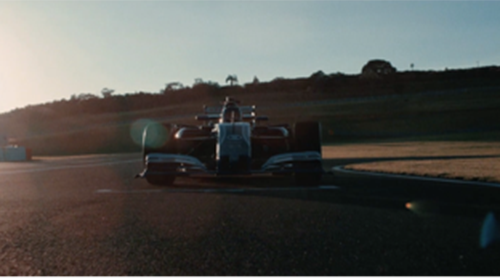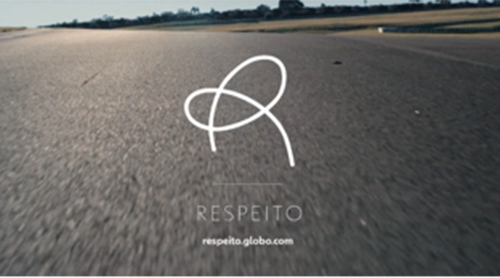In its new social campaign, “Powered by Respect,” Globo put a quadriplegic behind the wheel of a race car and enabled him to drive it using commands straight from his brain. It’s all part of the Brazilian media company’s new social responsibility campaign that combines technology and creativity to prove that respect can help overcome prejudice.
The initiative was developed in association with the Rodrigo Mendes Institute ― a non-profit organization that helps people with disabilities access high-quality education.
Its founder and CEO, Rodrigo Hübner Mendes, himself was left a quadriplegic at 18 after being shot during an armed robbery. Globo’s campaign spot reveals him driving a car for the first time since that terrible incident.
“Globo is committed to emotions. We’re great storytellers and this was a story that deserved to be told to the world,” says Mariana Sá, Globo’s Creative Director. “It was Rodrigo’s emotions that allowed him to drive again. His emotions are the campaign’s pinnacle.”
Mendes, who has loved cars from an early age, says the experience was overwhelming.
“All of a sudden, I was in a race car, wearing a helmet specifically created for me to drive using mind control. The team leader asked me if everything was okay and closed the visor. Everyone disappeared from my field of view. Suddenly it was me, the car and the track. I took a deep breath, concentrated and gave the order to speed up.”


The campaign, which won an award at the 2017 Cannes Lions Festival, was shot at the Velo Cittá race track, in Mogi Guaçu, a city on the outskirts of São Paulo. It premiered on March 26 during the Formula 1 Grand Prix 2017 opening ceremony, leveraging Brazilians’ passion for this event.
“Generations grew up watching the F1 races, so there was no better timing for its launch than the first season’s race, presented by Galvão Bueno, Brazil’s most influential sportscaster,” says Sá.
Embracing Differences
The campaign’s creative is centered in the concept of respect. This marks a first step towards changing attitudes and eliminating prejudices. That, in turn, revolves around accepting people’s differences.
“Respect [helps] build a society that values common benefit over personal interests and prejudice. In this sense, new technologies can help to overcome barriers, but what will allow the disabled to be seen in equal terms is respect for differences,” says Sá.
“People are not the same and they are not supposed to be. Caring about differences is essential so that everyone has equal rights,” adds Mendes, who says he wants to take advantage of this campaign’s potential to build a positive message.

Ideally, this flashy campaign will lead to a massive change of mindset, says Sá.
“We wondered, if a person with quadriplegia can drive an F1 race car, what else could he accomplish?” says Sá.
A Turning Point for Globo’s Technology
The project began by building a replica of a race car that could be driven by EEG brain signals. Globo developed a monitoring system to control speed, temperature and the driver’s heart rate through sensors embedded in the helmet and connected to the engine. The technology captured the driver’s brain waves, detected his thoughts and translated them into commands through a computer connected to the steering system. For safety measures, the car was equipped with a fully computerized system to control the steering, accelerator, brakes, clutch and gears.
A front camera was used to send images of the track to a maintenance system that helped keep the car within lane boundaries.
“The final result is a car that creates a driving experience directly from the driver’s thoughts,” says Raymundo Barros, Globo’s technology director.
“We did something that seemed impossible: using mind control to drive a race car,” says Sá. “We built the car, developed a new hybrid technology and ensured Rodrigo’s safety. The project took seven months of work and involved more than 100 professionals from different areas of Globo, as well as testing the car over more than 3,000 miles.”
Barros says Globo is constantly searching and studying emerging technologies.
“We have a DNA of innovation and our mission is to provide creative teams with the right technology to support all of their ideas. The more innovative the ideas, the more we strengthen our co-creation role to find the balance between magic and feasibility,” he says.
He also highlights the use of ground-breaking technology as a tool for storytelling.
“We believe that innovation and creativity are increasingly important for the creation of new content and the support of new business development,” he adds.
Social Responsibility on Social Media
The campaign included branded content in news programs, and on sports and entertainment channels, as well as ‘making of’ videos, interviews, social-media posts and the website respeito.globo.com, which extends the debate on inclusion.
The project has been well received on social media, with celebrities and journalists raising awareness for it through their own personal accounts. Mendes also mentioned the campaign at the Young Global Leaders Annual Summit in Buenos Aires in April and recorded a video with Tan Le, the creator of the EEG brain scanner, which she shared across social-media platforms. The spot appeared on the World Economic Forum fanpage, drawing more than 630,000 views.
When all was said and done, the Rodrigo Mendes Institute Facebook page saw a 317 percent increase in traffic.
“Tudo Começa Pelo Respeito”
The campaign, “Powered by Respect” is part of the platform “Tudo Começa Pelo Respeito” (Everything Starts with Respect), launched by Globo in 2016, in association with UNESCO, UNICEF, UNAIDS and UN WOMEN. It is aimed at strengthening a culture that tolerates and debates the rights of groups vulnerable to discrimination and prejudice.
The platform has disseminated marketing and creative assets addressing issues such as racism, violence against women and homophobia, among others. Actors and actresses have called on viewers to respect others regardless of their background and situation. Lázaro Ramos, for example, argues that racism only ends when respect begins, while Juliana Paes and Flávia Alessandra encourage camaraderie between fans of rival soccer teams.
Globo’s Role
Globo also is using this innovative project to highlight the role of social media in promoting positive changes in behavior.
“It is essential to spread this message via a large network such as Globo,” says Mendes. “It emphasizes technology’s importance in constructing a more inclusive society due to the power it has to help eliminate barriers. It also recalls that the most significant barrier imposed on people with disabilities are society’s prejudices and limited vision.”
Working with the Rodrigo Mendes Institute was key in the construction of this transformative conversation.
“This partnership increased the reach of the campaign,” Sá said, “and gave our message support and credibility.”
Version español: La nueva campaña social de Globo potenciada por el respeto
Enter your great work in the PromaxBDA Latin America Awards and join us in Miami for the awards ceremony on November 8.
Tags:













































__twocolumncontent.jpg)











